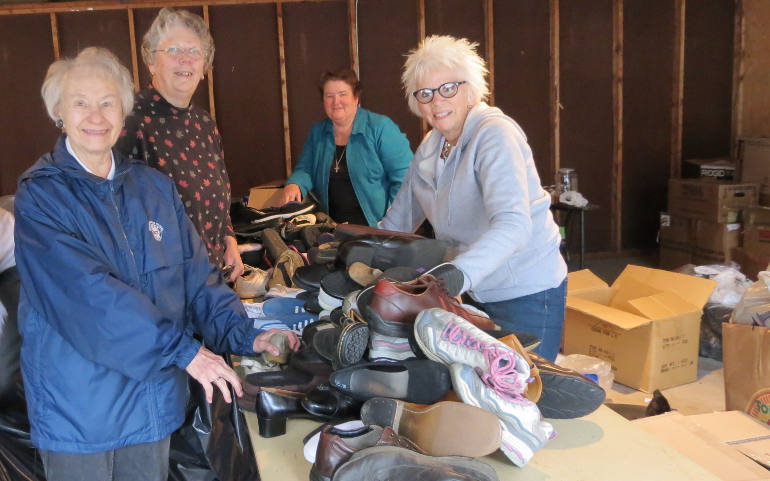
Donated shoes pile up on a table in October at the Sisters of Notre Dame Provincial Center, in Toledo, Ohio, waiting to be counted and bagged. From left, Rita Konecki, Dorothy Wodrich, Notre Dame Sr. Frances Marie Penwell and Linda Schlachter. (Teri Bockstahler)
Forget about visions of sugarplums dancing in her head; Sr. Frances Marie Penwell has been seeing shoes and handbags.
But it’s no wonder, as Penwell and 26 hardworking volunteers in Toledo, Ohio, have been preoccupied since July with the sorting, counting and bagging of more than 24,000 pairs of footwear. Add to that an additional 9,270 purses, to boot.
Their daunting task took off running after the Notre Dame sister agreed to coordinate a fundraising effort for her order's Toledo province. Through a St. Louis-based organization called Gateway2Give, the items they collected transformed into financial support for a clean water project in Peten, Guatemala, sponsored by a group called SewHope.
Founded by Toledo physician Dr. Ann Ruch, SewHope offers a bevy of services for women and children, including health care, nutrition and sanitation programs.
Penwell hopes that the shoes and handbags will bring in enough funds to supply an abundance of water filters for the people of Peten. The more filters the sisters can finance the better, as much of Peten’s water contains bacteria, which can often lead to illness in children.
Gateway2Give, founded by social entrepreneur Julie Scaglione, helps groups like the Notre Dame sisters swap used shoes and bags for support of global clean water initiatives. The items collected are sold to exporters for affordable sale in developing countries as a catalyst to grow local microbusinesses and local economies.
Scaglione launched the organization, as well as her own water project Clean Water Mission, after taking a trip to Haiti, where she saw firsthand the misery that can result when potable water is lacking.
“Moms and their children didn’t even have the basic necessities like clean water to bathe or cook with,” Scaglione told NCR, with her hope now to bring clean water to one billion thirsty people.
Penwell estimates each pound her province collects will garner anywhere from 50 to 60 cents. The environment benefits from the initiative, as well, since the shoes and purses stay out of local landfills.
Other shoe-and-purse collections sprouted elsewhere in the province, with Sr. Marie Kathleen Hood coordinating in Indianapolis and Ft. Wayne, Ind., while Sr. Lea Paolucci led a separate effort in the Covington, Ky., province.
The two provinces’ decision to take part emerged during a spring meeting of coordinators for the Notre Dame community’s Justice Peace and Integrity of Creation committees, where the sisters became intrigued with the idea of trading clutter for clean water.
The committee voted unanimously to team up with Scaglione and Gateway2Give, and began contacting their schools, parishes, associates and local thrift shops. Several sisters took to social media to spread the word. At Notre Dame Academy, in Covington, an online skit features one student who morphed into “the campus shoe bandit” and literally stole the shoes off of unsuspecting feet.
By July two pick-up trucks delivered the first tower of donations to Toledo. From there, the question “Where should we put these?” would echo among donors and helpers more than 17 times, as more shoes and purses poured in throughout the summer and fall from parish and school donation drives.
The volunteers watched, mind-boggled, as the piles grew larger and larger inside the storage shed they had commandeered at the Toledo provincial house headquarters.
At the same time, little things they hadn’t initially considered began to surface: How would they afford to buy enough garbage bags needed for the packing? Would those expenses eat into the profits the sisters would stand to make and donate?
But as the questions percolated, small miracles appeared. In the purses the volunteers cleaned out they found dollar bills and coins people had left behind. Lots of them. Enough, as it turned out, to completely pay for the garbage bags. Penwell and her weary volunteers “got a good laugh,” she said, one afternoon when she discovered a plastic card in one of the purses that read, “Shoe lover.”
In early December Scaglione sent two trucks -- an 18-wheeler to Toledo, and a 14-foot truck in Covington -- to pick up the collections. For the Kentucky province the final tally totaled 25 big garbage bags.
Paolucci recalled one of the donations with special poignancy. A group of moms, former students of a Harlan, Ky., grade school where Norte Dame sisters taught, drove a total of eight hours to deliver their collection, eager to help and grateful for the sisters.
By Christmas, or possibly sooner, the Toledo province will have a check to send to Guatemala, and the Covington province to Uganda. For the people living in both countries, having access to clean water will come as one of the greatest Yule gifts they could receive. The blessing will last all year long and beyond.
“I can’t wait to see the pictures coming out of Peten [in Guatemala] and Buseesa [in Uganda] when they get their water filters and storage tank,” Scaglione told NCR.
The Notre Dame sisters’ combined collections “are the biggest, so far, by a group,” she said. “It just goes to show how eager people are to help. They want to do something besides writing a check.
“And giving shoes and purses is such an easy way to get involved in the helping.”




